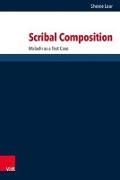- Start
- Scribal Composition
Scribal Composition
Angebote / Angebote:
The Hebrew Bible is the product of scribes. Whether copying, editing, conflating, adapting, or authoring, these ancient professionals were responsible for the various text designs, constructions and text-types that we have today. Sheree Lear seeks to investigate the many practices employed by ancient scribes in literary production, or, more aptly, scribal composition. Using Malachi as a test-case, three autonomous yet complementary chapters will illustrate how investigating the text as the product of scribal composition can yield new and important insights. Chapter 2: Mal 2.10-16 focuses on a particularly difficult portion of Malachi (2.10-16), noting patterns amongst the texts reused in the pericope. These patterns give information about the ancient scribe's view of scripture and about his communicative goal. Chapter 3: Wordplay surveys Malachi for the implementation of different types of the wordplay. The chapter demonstrates how a poetic feature such as wordplay, generally treated as a synchronic element, can also have diachronic implications. Chapter 4: Phinehas, he is Elijah investigates the reception of Malachi as a finished text. By tracing backwards a tradition found throughout later Jewish literature, it is evident that the literary techniques employed by the composer made his text successfully communicative.
Libri-Titel folgt in ca. 2 Arbeitstagen
